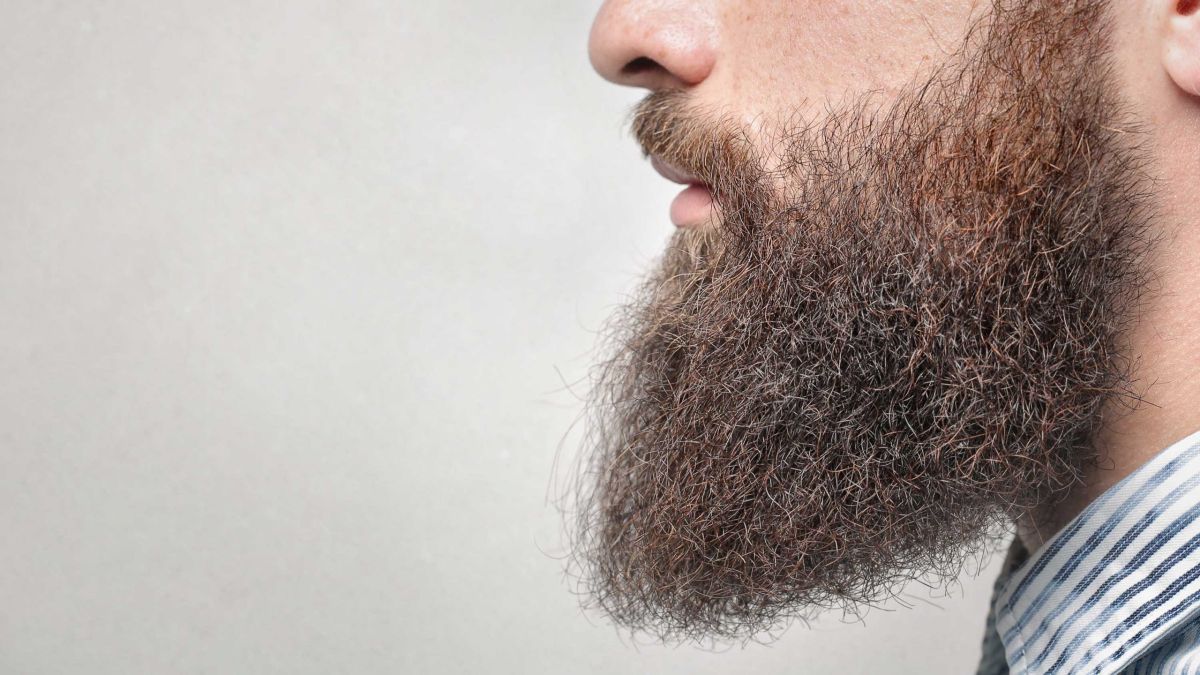The Position of the Beard in Islām
Imām Badīʿ al-Dīn Shāh al-Sindī


All praise is for Allāh, Lord of the Worlds; and prayers and peace be upon the Master of the Prophets and Messengers, and his household, family and companions; whomsoever follows them with goodness until the Day of Recompense. To Proceed:
Allāh the Mighty and Majestic has made the figure of the human being very well and pleasing. As He said,
لَقَدْ خَلَقْنَا الْإِنسَانَ فِي أَحْسَنِ تَقْوِيمٍ ﴿٤﴾
“We have certainly created the human being in the best of moulds.”
[al-Tīn, 95:5]1
It is proven that man’s figure is very well and pleasing. And Allāh the Mighty and Majestic has created humans in pairs, for external distinction in both (i.e. male and female). He made the man having a beard, with which beauty and dignity augments. Such that, it is a crown of a man’s face. Hence, it is generally observed that for each and every madh′hab (mode of life, religion, ideology, etc.), be it Muslim or non-Muslim, the chieftain is bearded. Such that, man naturally considers the beard to be a source of honor. [That is so] because this is a divide hue (frame: religion), in comparison to which, there is no other hue,
صِبْغَةَ اللَّهِ ۖ وَمَنْ أَحْسَنُ مِنَ اللَّهِ صِبْغَةً ۖ وَنَحْنُ لَهُ عَابِدُونَ ﴿١٣٨﴾
“Our religion is the religion of Allāh. And who can give a better religion than Allāh? And we are His worshippers.”
[al-Baqarah, 2:138]
So long as the mentality of the Muslims was secure from the hue of the polytheists, and the Jews and the Christians and their like, both, whether man or woman, considered the beard to be an adornment and beauty for the man.
Accordingly, Ibn Batūṭah in his travelogue entitled, Tuḥfat aln-Nazār fī ʿAjāʾib al-Asfār (1/17) records an occurrence which goes as follows: Shaykh Jamāl al-Dīn Sāwī was a very handsome person. Hence, one woman was infatuated with him, and through some type of pretense, called in to her house. After entering she had the doors closed. Then she called the Shaykh towards her for evil (fornication). The Shaykh tried his best to escape. However, when he did not find any means of escape, he first decided to go to the toilet and after entering, he took a blade and shaved his beard with it. When he came out, the woman found his face to be so hideous that she was disgusted with him. Thus he came out safe and secure, escaping evil.
Dear readers, consider this: When the mind was pure, the divine shape was liked by everyone. When the mind became impure, the good appearance appeared bad and the bad appearance appeared good. In fact, this is a mischief of shayṭān who dared to speak before Allāh the Mighty and Majestic and said,
وَقَالَ لَأَتَّخِذَنَّ مِنْ عِبَادِكَ نَصِيبًا مَّفْرُوضًا ﴿١١٨﴾ وَلَأُضِلَّنَّهُمْ وَلَأُمَنِّيَنَّهُمْ وَلَآمُرَنَّهُمْ فَلَيُبَتِّكُنَّ آذَانَ الْأَنْعَامِ وَلَآمُرَنَّهُمْ فَلَيُغَيِّرُنَّ خَلْقَ اللَّهِ ۚ ﴿١١٩﴾
“I will surely take from among Your servants a specific portion. And I will mislead them, and I will arouse in them [sinful] desires, and I will command them so they will slit the ears of cattle, and I will command them so they will change the creation of Allāh.”
[al-Nisāʾ, 4:118-119]
Meaning, the ways and means of leading astray that he directed Allāh’s servants to. Among them was that he would instruct them that they should change Allāh’s form of creation. And the Divine Commandment goes as follows,
فَأَقِمْ وَجْهَكَ لِلدِّينِ حَنِيفًا ۚ فِطْرَتَ اللَّهِ الَّتِي فَطَرَ النَّاسَ عَلَيْهَا ۚ لَا تَبْدِيلَ لِخَلْقِ اللَّهِ ۚ ذَٰلِكَ الدِّينُ الْقَيِّمُ وَلَٰكِنَّ أَكْثَرَ النَّاسِ لَا يَعْلَمُونَ ﴿٣٠﴾
“So direct your face towards the religion, ḥanīf (upright on the truth). Adhere to the fitrah2 of Allāh, upon which He has created the people. No change should there be in the creation of Allāh. That is the straight religion, but most of the people do not know.”
[al-Rūm, 30:30]
Imām of Hind, Shāḥ Waliyyullāh ad-Dihlawee says in Hujjatullāhil-Baalighah (1/152), “Its cutting, meaning the beard, is the way of the Magians3, and it is the altering of Allāh’s creation.” And likewise shaving of the beard resembles oneself to the woman, about which there is a severe threat. It is narrated from Ibn ʿAbbās (raḍī Allāhu ʿanhu) that the Prophet (ﷺ) has cursed the men who imitate women and the women who imitate men.4 And similarly, Ibn ʿAbbās’ narration is also related in Musnad Aḥmad, Abū Dāwūd, Tirmidhī and Ibn Mājah. It is narrated that the Prophet (ﷺ) said, “Allāh has cursed the women who imitate men and the men who imitate women.”5
Dear onlookers, that deed on which is the curse of Allāh and His Messenger (ﷺ) is considered a very major and perilous sin. Al-ʿAllāmah Ibn Ḥajr al-Haythamī has included it among the major sins in az-Zawājir ʿan Iqtirāf al-Kabāʾir. And externally, the beard is man’s specific distinction, and the absence of the beard is the woman’s specific distinction. So whoever shaves the beard certainly resembles the woman. Imām al-Ghazālī says in Iḥyāʾ ʿUlūm al-Dīn (2/257), “And with it, meaning the beard, men are distinguished from women.” So he (the man) is included in this severe threat. And the beard is the Sunnah (exemplary way) of all the Prophets. Accordingly, there is a mention of Harūn’s (ʿalayhi al-ṣalātu wa-al-salām) beard in the Noble Qurʾān,
قَالَ يَا ابْنَ أُمَّ لَا تَأْخُذْ بِلِحْيَتِي وَلَا بِرَأْسِي ۖ إِنِّي خَشِيتُ أَن تَقُولَ فَرَّقْتَ بَيْنَ بَنِي إِسْرَائِيلَ وَلَمْ تَرْقُبْ قَوْلِي ﴿٩٤﴾
“O son of my mother, do not seize me by the beard or by my head.”
[Ṭa-Hā, 20:94]
Also, there is a mention of both Mūsá (ʿalayhi al-ṣalātu wa-al-salām) and Ādam’s (ʿalayhis-ṣalātu was-salām) beard in ad-Durr al-Manthūr (1/62). And there is also an ordered in the Qurʾān,
أُولَٰئِكَ الَّذِينَ هَدَى اللَّهُ ۖ فَبِهُدَاهُمُ اقْتَدِهْ ۗ ﴿٩٠﴾
“Those (Prophets) are the ones to whom Allāh has guided, so take their guidance as an example.”
[al-Anʿām, 6:90]
That is, take as an example only those deeds other than which the Sharīʿah (Divine Law) of Muḥammad (ﷺ) has abrogated. However, this Sharīʿah did not abrogate the ruling on the beard. Rather, it has affirmed and emphasized it. Therefore, our Supreme Guide, Master of the Prophets and Messengers, Muḥammad’s (ﷺ) blessed beard filled his chest. As is related by Yazīd al-Farsee in Shamaa‘ilut-Tirmidhī, “Chapter of Seeing the Prophet (ﷺ) in a Dream,’ who said, ‘Indeed, I saw the Messenger of Allāh (ﷺ) in a dream.’ So he said, ‘Verily, the Messenger of Allāh (ﷺ) used to say, “Indeed, the Shayṭān cannot imitate me, so whoever has seen me in a dream has indeed seen me.” Can you describe the person you have seen in the dream?’ I said. ‘Yes. I will describe him between the spectrum of two men. His body and flesh were moderate, complexion was brown-skinned, inclining towards whiteness, eyes were kohl-smeared, smile was pleasant, figure was beautiful and round-like, his beard reaching here to here and it filled his chest.’ So Ibn ʿAbbās said, ‘If you had seen him while awake, you could not have described him beyond that.’”
Similarly, the four well-known Caliphs, Abū Bakr, ʿUmar, ʿUthmān and ʿAlī, all had large beards. As mentioned in Tabaqāt Ibn Saʿd (3/114), Tārīkh al-Khulafāʾ li-al-Suyūtee (p. 102, 116, 129). Also, the shaving and cutting of the beard resembles the polytheists and Magians. That is why avoiding it is definitely obligatory upon Muslims. This is so because whoever imitates a people, is included among them. As is the saying of the Messenger of Allāh (ﷺ), “Whoever imitates a folk is but among them.”6
Dear readers, shaving the beard is [indeed] distinguished of oneself, meaning, making oneself defective. As Imām Fakhr al-Andalus Ibn Hazm says in Marātib al-Ijmāʿ (p.157), “They (the scholars of the Ummah) are in agreement that shaving the whole beard is disfiguring – not permissible. So, al-Ḥākim has brought in Mustadrak a narration by ʿImrān and al-Ṭabrānī from the ḥadīth of Ibn ʿUmar and Mughīrah (raḍī Allāhu ʿanhumā), “The Messenger of Allāh (ﷺ) has prohibited disfigurement.”7
The meaning of disfigurement is “making defective.” The disfigurement of the body is to amputate the nose and lips. And the disfigurement of the hair is to shave and depilate the hair of the cheek or to dye the hair black. As mentioned in the famous book of language and ḥadīth, al-Nihāyah fī Gharīb al-Ḥadīth wa-al-Āthār authored by Imām Ibn Athīr al-Jazarī (2/294) and Majmaʿ Bihār al-Anwār authored by al-ʿAllāmah Muḥammad Tāhir Patnee, (3/289). Therefore, this is also the reason why the shaving of the beard is prohibited. Rather, there is severe warning against the disfigurement of the cheek.
In Muʿjam al-Kabīr (11/41), there is a narration by Ibn ʿAbbās (raḍī Allāhu ʿanhu), “Indeed, the Messenger of Allāh (ﷺ) said, “Whoever disfigures his hair, there is no share for him with Allāh.” Although there is a kalām (discussion, debate) about this narration, since the real issue is proven through several evidences, quoting such narrations are useful for the purpose of targhīb wa-al-tarḥīb (incitement and intimidation). And in the books, al-Nihāyah and Majmaʿ al-Bihār the wording of this narration is, “The disfigurement of the cheeks is shaving the hair of the cheeks.” Rather, all four madhāhib (schools of jurisprudence) which are attributed to the imams: Imām Abū Ḥanīfah, Imām Mālik, Imām al-Shāfiʿī and many other imāms have declared the shaving of the beard unlawful.7
Dear onlookers, in the previous subject matter few aḥādīth were mentioned, from which the virtue and emphasis of the beard is made evident. And its shaving and cutting is proven to be a loathsome act. These are great facts for a sensible Muslim and his admonition. After this, specifically those aḥādīth will be mentioned by which the virtue of leaving the beard and its emphasis, and besides that the evil and harm of shaving and cutting, is known. May Allāh grant us the tawfīq (Divine-help) to receive this admonition – āmīn.
The First and Second Ḥadīth:
From Ibn ʿUmar, who said, ‘The Messenger of Allāh (ﷺ) said, “Differ from the mushrikīn (polytheists), save the beards and trim the moustaches.” And in another narration, “Sharply trim the moustaches and leave the beards.”7
Explanation:
In this ḥadīth, there is an order to grow and leave the beard, and the command of the Messenger of Allāh (ﷺ) is for the purpose of obligation and mandate. As described the scholars of principles (uṣūl) of jurisprudence. As mentioned in al-Manār ma’a Sharḥin-Nūrul-Anwaar, (p. 230), at-Tawdeeh ma’a Sharḥit-Talweeh, (1/132) Uṣūl-Sarkhasee (p. 185), Uṣūl al-Bazdawee (p. 21), Sharḥul-Manār li Ibni Mālik ma’a Hawaash lir-Rahaawee wa Azmee Zaadah wabnul-Hatbee (p. 120), al-Husaamee (p. 40). And al-’Allāmah Ibn Haajim Jamālud-Dīn says in Mukhtasar Uṣūl, “The masses of scholars said that the order in fact amounts to obligation with the masses of scholars.” And in its explanation (Tahreer’s) authored by Ameer Badshah, it says, “Al-’Allāmah Ibn Haajib Baydaawee says it is correct. Imām Rāzee says it is the truth and Aamadee and Imāmul-Haramayn of Shaafi’ee madh′hab say, ‘And it is said that this was dictated by Ashʿarī to his companions.’” So leaving the beard is obligatory. And its shaver and cutter is a renouncer of an obligation. And renouncer of an obligation is considered a fāsiq (open-sinner). And as for he who opposes the order of the Messenger of Allāh is a very great admonishment,
فَلْيَحْذَرِ الَّذِينَ يُخَالِفُونَ عَنْ أَمْرِهِ أَن تُصِيبَهُمْ فِتْنَةٌ أَوْ يُصِيبَهُمْ عَذَابٌ أَلِيمٌ ﴿٦٣﴾
“So let those beware who oppose from his (the Prophet’s) order, lest fitnah (trial, tribulation) strike them or a painful punishment.”
[al-Nūr, 24:63]
Also, it is proven by this ḥadīth that cutting of the beards is the action of the mushrikīn, not the Muslims. And whoever imitates them is considered among them, as [mentioned] in the previous ḥadīth. So the person who shaves the beard is a mushrik by his appearance and image.
Benefit:
The word “awfiru” is from “awfara” which means “plenty.” So the meaning of awfiru will be grow the beard and leave it. So that the hair will become dense. As “waffaraahu tawfīran: kal-atharahu” (in-creased it and grew it).”8 And in another narration is the “āʿfū”which is from “iʿfāʾ.” As in the famous book of Language of Ḥadīth, al-Nihāyah fī Gharīb al-Ḥadīth li Ibn al-Athīr (3/366), “Chapter of ʿayn with fā,” “And that is he leaves its hair and does not cut like the moustaches from explanation of “He left the beard” when it is said “It multiplies and increases.” The meaning, “Iʿfaʿ al-Liḥā” is that the hair of the beard should be grown and should not be cut like the moustaches. The origin of this is from “Iʿfāʾ al-Shayʾ,’” meaning that thing which increased and multiplied.
Endnotes:
- That is, upright, symmetrical and balanced in form and nature.
- Fitrah (natural state, innate predisposition): It is an innate inclination of man to worship his Creator prior to the corruption of his nature by external influences (environment). Thus, Islām is described as the Religion of fitrah – that of the inherent nature of mankind.
- An ancient religion that teaches the worship of fire.
- Related by al-Bukhārī, (2/874).
- Refer to al-Jāmiʿ al-Ṣaghīr (2/123).
- Refer to al-Jāmiʿ al-Saghīr (2/167), reference to Abū Dāwūd from the ḥadīth of Ibn ʿUmar, and reference to al-Tabarānī al-Aswat from the ḥadīth of Hudhayfah. For further explanation of its meaning refer to ḥadīth (no. 1) below.
- Refer to al-Mishkāt (no. 38).
- Tartīb al-Qāmūs (4/636)
Translated by Ejāz Shaykh and Anonymous for Hudaa Magazine (late 90s)
Most Popular: Last 30 Days

















